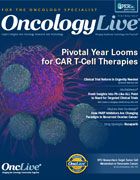Community Commitment Helped Launch OX40 Research
William L. Redmond, PhD, discusses the early development and characterization of OX40 agonists.
William L. Redmond, PhD
William L. Redmond, PhD, an expert in the immunology of cancer, is an associate member of the Laboratory of Cancer Immunotherapy and director of the Immune Monitoring Laboratory at the Earle A. Chiles Research Institute at the Providence Portland Medical Center in Portland, Oregon.
What is the role of OX40 in the normal immune system?
Given that research into OX40 agonists began in 2006, why has it taken so long to kickstart clinical development?
The Providence Cancer Center was involved in the early development and characterization of OX40 agonists. The main focus of Redmond’s research is to investigate the mechanisms of OX40 agonist activity in enhancing tumor immunotherapy.OX40 is an activating receptor on white blood cells, specifically on T cells. When OX40 gets stimulated, it is equivalent to putting your foot on the gas pedal of the immune system. It is the opposite idea from checkpoint blockade in that OX40 ligation drives stronger immune responses, while blocking CTLA-4 or PD-1 is the equivalent of taking the brakes off the system.The development of OX40 agonists is quite a fascinating story. The original OX40 agonist phase I clinical trial was done here at our institute and that was funded through peer-reviewed grants as well as philanthropy. So the community here in Portland helped to support making a drug and then doing a phase I trial. This is a very unusual pathway to get a new agent to patients, but there was a really strong commitment from the leadership here at our cancer center and from the community.
With our limited resources, we were able to produce the drug in sufficient quantities to do a clinical trial.
However, the antibody was a mouse anti-human antibody and not a humanized antibody. At the time, the technology to humanize the drug was extremely expensive and we didn’t have the financial resources to do that. So we used that first clinical trial to evaluate the safety and potential immunological activity, with the hopes that we could then identify an industry partner to facilitate further clinical development.
What are the most significant challenges in developing OX40 agonists?
That’s exactly what happened. Part of the development then was humanizing the antibody, which was a necessity for further clinical development. If you inject someone with a mouse anti-human antibody, you can only do that for about a week and then your body rejects the drug because it’s recognized as a foreign protein. You can’t give multiple doses over time; you have to humanize the drug to be able to administer it repeatedly to patients. So that chemistry, that process, took some time, and that was another part of the delay. But now it’s in multiple phase I trials and is being studied much more extensively.The first point is that it’s a matter of getting the studies done to determine which patients and tumor types respond best to this drug. Some drugs are particularly effective in specific subtypes of disease and so the same questions are being asked with OX40 agonists. Phase I clinical trials are looking at a range of tumor histologies to see where the strongest signal is.
The second question right now and where a lot of effort is being focused is combination therapy: what are the appropriate combinations, what’s the right way to sequence the drugs (together or one then the other) and how can we combine them with standard-of-care therapies, like chemotherapy, radiation, and even surgery? With surgery, do you give it before surgery, postsurgery?
So, there are many issues that are being worked through. Obviously, that is going to take quite a lot of time and resources, but we are committed to finding the best way forward for this drug.




